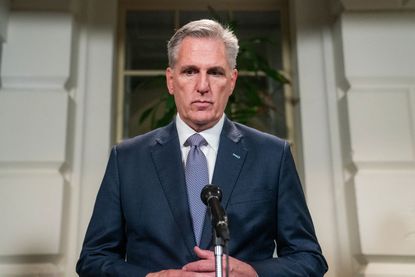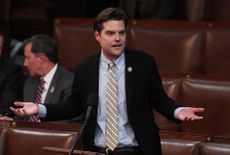How Kevin McCarthy 'dug his own grave' in his failed bid to remain House speaker
McCarthy's speakership did not have to collapse in such a dramatic fashion


A free daily digest of the biggest news stories of the day - and the best features from our website
Thank you for signing up to TheWeek. You will receive a verification email shortly.
There was a problem. Please refresh the page and try again.
"Bring it on," Rep. Kevin McCarthy (R-Calif.) said Sunday on CBS's "Face the Nation," confidently predicting he would "survive" Rep. Matt Gaetz's (R-Fla.) looming motion to oust him as House speaker. "Let's get over with it and let's start governing."
"Bring it on," McCarthy repeated Monday, this time on X, formerly known as Twitter. Gaetz did, filing a motion Monday night to vacate the speaker's chair. On Tuesday, seven Republicans and 208 Democrats joined him and pushed that motion over the finish line, and McCarthy was evicted from the speaker's office. The House was leaderless and will not start governing again until Republicans elect a new speaker.
How did McCarthy go from the top elected Republican in America and second in line for the presidency to just another congressman from California? "He dug his own grave," one Democratic House member told The Washington Post. Here are some of McCarthy's missteps on his path to becoming the shortest-tenured House speaker in a century and the first to be voted out by his own colleagues.
How McCarthy lost 8 Republicans
The animosity between Gaetz and McCarthy was palpable and personal, but "the proximate cause of McCarthy's fall was his decision, during his agonizing 15-ballot ascent to the speakership in January, to accept a change in House rules that allowed a single member to file a motion to remove him," Ronald Brownstein wrote at The Atlantic.
That's how Gaetz, one of the hardliners who made lowering that threshold a precondition for McCarthy's election, was able to unilaterally force a vote on his continued speakership. But Gaetz still needed at least five more Republicans to join him in his motion to vacate, and he got seven. Many of them cited a "lack of trust in McCarthy," The Wall Street Journal reported.
Subscribe to The Week
Escape your echo chamber. Get the facts behind the news, plus analysis from multiple perspectives.

Sign up for The Week's Free Newsletters
From our morning news briefing to a weekly Good News Newsletter, get the best of The Week delivered directly to your inbox.
From our morning news briefing to a weekly Good News Newsletter, get the best of The Week delivered directly to your inbox.
Time and again, McCarthy's GOP critics said, he "would make a commitment to them for some legislation or favor, only to learn that he had some other commitment to another set of Republicans that was in direct conflict," the Post reported. Several of his GOP detractors pointed to McCarthy's reversal on funding the government with a stopgap bill to avert a shutdown over the weekend. "He had told conservatives for weeks that he wouldn't pass legislation with Democrats — only to decide to do just that in a last-minute pivot," the Post added. "Conservatives were infuriated."
Most of the eight Republicans who voted to oust McCarthy are on the GOP's hard right, but Rep. Nancy Mace (R-S.C.) is not. "I've made deals with Kevin McCarthy, with the speaker, that he has not kept to help women in this country," she explained. "When you shake my hand and you make a promise and you don't keep it, there are consequences to those actions."
Why Democrats didn't save his gavel
In the days before Tuesday's vote, "Democrats had wrestled with whether to help" rescue McCarthy "or at least to stay out of the effort to oust him," The New York Times reported. But he never publicly asked for their help, and their "disdain" for McCarthy "ultimately overrode any political will they had to save him." A closed-door caucus meeting Tuesday "quickly became an airing of grievances."
"There are lots of reasons Democrats dislike McCarthy," the Post reported. He rehabilitated former President Donald Trump soon after denouncing him for the Jan. 6, 2021, attack on the Capitol, tried to thwart Jan. 6 investigations, and "just launched an impeachment inquiry into President Biden over 'allegations,'" the Post added. "But the last straw for them was seeing McCarthy on TV over the weekend trying to blame Democrats for the near-shutdown."
In their caucus meeting, Democrats watched a video of McCarthy claiming they had wanted to shut down the government, and they were "outraged" at his misrepresentation of events, Rep. Gerry Connolly (D-Va.) told the Post. "His performance was a very clarifying event for Democrats."
"Nobody trusts Kevin McCarthy, and why should they?" said Rep. Pramila Jayapal (D-Wash.).
Democrats, especially moderate, said they would have aided McCarthy if he had asked for their help and offered some small concessions. But he did neither. "Speaker McCarthy has repeatedly chosen to weaken the institution by bending to extremists rather than collaborating across the aisle," said Rep. Derek Kilmer (D-Wash.). "He has inherited the chaos he has sown."

Continue reading for free
We hope you're enjoying The Week's refreshingly open-minded journalism.
Subscribed to The Week? Register your account with the same email as your subscription.
Sign up to our 10 Things You Need to Know Today newsletter
A free daily digest of the biggest news stories of the day - and the best features from our website
Peter Weber is a senior editor at TheWeek.com, and has handled the editorial night shift since the website launched in 2008. A graduate of Northwestern University, Peter has worked at Facts on File and The New York Times Magazine. He speaks Spanish and Italian and plays bass and rhythm cello in an Austin rock band. Follow him on Twitter.
-
 Ben Fountain's 6 favorite books about Haiti
Ben Fountain's 6 favorite books about HaitiFeature The award-winning author recommends works by Marie Vieux-Chauvet, Katherine Dunham and more
By The Week Staff Published
-
 6 picturesque homes in apartments abroad
6 picturesque homes in apartments abroadFeature Featuring a wall of windows in Costa Rica and a luxury department store-turned-home in New Zealand
By The Week Staff Published
-
 Why 2023 has been the year of strikes and labor movements
Why 2023 has been the year of strikes and labor movementsThe Explainer From Hollywood to auto factories, workers are taking to the picket lines
By Justin Klawans Published
-
 Is Trump’s Jim Jordan endorsement about the speakership or himself?
Is Trump’s Jim Jordan endorsement about the speakership or himself?Today's Big Question By backing his longtime congressional ally, the former President keeps an eye out for number one.
By Rafi Schwartz Published
-
 'The beginning of the end'
'The beginning of the end'Instant opinion Opinion, comment and editorials of the day
By Harold Maass Published
-
 Is Rep. Patrick McHenry a major player or a transitionary flash in the pan?
Is Rep. Patrick McHenry a major player or a transitionary flash in the pan?Today's Big Question With nebulous authority over a fractured Republican caucus, the newly installed speaker pro tempore has his work cut out for him.
By Rafi Schwartz Published
-
 'Some bad ideas just won't die'
'Some bad ideas just won't die'Instant opinion Opinion, comment and editorials of the day
By Harold Maass Published
-
 Will Matt Gaetz's push to oust Kevin McCarthy backfire on him?
Will Matt Gaetz's push to oust Kevin McCarthy backfire on him?Talking Point Some Republicans are calling for the Florida Republican to be expelled from the House
By Justin Klawans Published
-
 Where do Republicans go from here?
Where do Republicans go from here?Today's Big Question The acrimonious removal of Kevin McCarthy is a sign of choppy waters ahead for the GOP
By Rafi Schwartz Published
-
 Kevin McCarthy says he won't run for House speaker again after historic ouster
Kevin McCarthy says he won't run for House speaker again after historic ousterSpeed Read McCarthy became the first speaker ever removed by his House colleagues, and he leaves no obvious successor
By Peter Weber Published
-
 What is Rep. Matt Gaetz's endgame?
What is Rep. Matt Gaetz's endgame?Today's Big Question The MAGA congressman loves to sow chaos, but there might be more to his latest moves than just disruption.
By Rafi Schwartz Published










